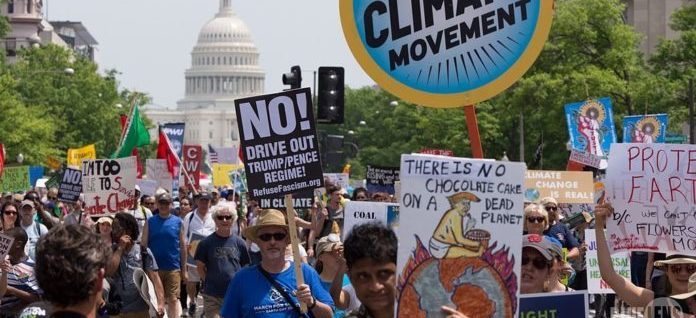Representatives from almost 200 countries met in Marrakech over two weeks for the latest annual climate change conference, COP22, which was viewed as an opportunity to showcase progress and commence the important process of turning the COP21 Paris Agreement into a detailed plan of action.
But the election of Donald Trump as the future president of the US cast a long shadow over progress made at the conference and a huge question mark hung over whether he would pull the US out of the Paris Agreement. However, the world leaders at COP22 and across the globe doubled up on their commitments to address climate change and major fossil fuel exporter countries in the Middle East including Saudi Arabia and UAE have been among those vocal groups of countries insisting that the US election outcome will not affect their plans to curb greenhouse gases under the Paris deal.
Global impact
Donald Trump’s victory in the US presidential election reverberated around the world. The political uncertainty surrounding a Trump administration added confusion to a task that was already extraordinarily difficult. Global warming is a near-perfect example of the tragedy of the commons, as it is a problem that no individual action, no single country can resolve on its own.
On the one hand, this suggests the great danger of a Trump presidency’s reversal of climate change policies could bring about a global knock-on effect, pushing the world toward harsh nationalism and reduced international environmental cooperation. On the other hand, there is a veiled hope that the negative impacts of US climate policy under Trump will be limited by the current momentum in technological advancement and other factors. But these steps have been complicated because the Paris deal requires billions of dollars in public and private climate finance to be channelled from rich to poor countries and President-elect Trump vowed during the election campaign to end US funds to UN climate programmes.
Ahead of the next conference under the presidency of Fiji, which will be hosting COP23 in Bonn, Germany, the one issue that will be closely monitored by the participating nations will be the new President Trump’s pledge to scrap President Obama’s Clean Power Plan and the COP21 agreement. That said, if Trump was not to honour commitments under the Paris Agreement, it is likely that this will negatively impact his ability to get the cooperation of world leaders on other issues.
Gulf countries vowed to adhere to the Paris Agreement
In the wake of the Trump victory, Saudi Arabia, by far the world’s largest oil exporter, has publicly vowed to adhere to its Paris Agreement pledges. Saudi Arabia says it will press ahead with pledges it made under the Paris climate change accord, even if president-elect Donald Trump pulls the US out of the global deal after he is sworn in. It further added it had “no intention of watering down” its commitments to the deal. Other key Gulf countries like UAE, the first Gulf nation to ratify the Paris Agreement, echoed similar words of support to adhere to and go ahead with economic diversification and implementing the accord.
This is a promising indication of how isolated the US may be if it abandons the climate agreement that virtually every country in the world struck last December in Paris, as the world’s largest oil exporter said that the commitment of other economies such as China and France underlined the accord’s strength.
After COP22
As the curtain fell in Marrakech, the delegates leaving COP22 gave a resounding message to the world that the COP21 Climate Agreement is here to stay and would be driven forward regardless of what America decides. We can only hope that, in the event that America does withdraw its support, the Agreement really is bigger than any one country as has been claimed. However, the US, being the most powerful economy in the world and the second largest emitter of greenhouse gases, must respect the commitments that were made. It’s not simply its duty, it’s in the common interest of humanity.
We need to recognise that the climate issue is a global issue. At the end of the day, this process is resilient enough to move forward with global cooperation and commitment. We haven’t won the battle yet, we need to get more of a movement going. We need to get more people to engage.


Recent Comments